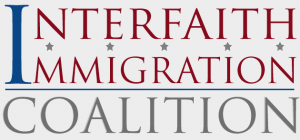The New Values Voters: Immigration

SOURCE: AP/Julie Bennett
Pedro Contrera, an immigrant from Vera Cruz, Mexico, and resident of Birmingham, Alabama, protests H.B. 56, Alabama’s immigration law, while marching in the Selma to Montgomery Voting Rights March re-enactment, Thursday, March 8, 2012, in Montgomery, Alabama.
This past March, a month that marked the 47th anniversary of the Selma to Montgomery march in 1965, faith leaders joined activists and advocates on the historic Edmund Pettus Bridge in Alabama to protest the state’s anti-immigration law, H.B. 56, which has had drastic consequences on immigrant and U.S.-born families since its passage last November. Just as the 1960s’ civil rights movement was inspired and championed by religious leaders who articulated the moral imperative for legal, political, and cultural reform, religious leaders today are calling upon the nation to create a common-sense immigration process that reflects our nation’s core values of treasuring human dignity, honoring family, and caring for our neighbor.
Faith-based advocacy for immigrants and their families is nothing new. Yet as states continue to propose and pass anti-immigrant legislation, the chorus of faith-based voices calling for the creation of a realistic process that includes a roadmap for New Americans who aspire to be citizens has strengthened and diversified. Conservative evangelicals, Mormons, mainline Protestants, and Southern historically black churches have all stood up—and in some cases worked together—to push for policies that protect immigrant communities.
The role of faith leaders
Faith leaders see the effects of anti-immigrant policies in their congregations and communities. They witness firsthand that children are afraid to go to school, neighborhoods are afraid to report crime to the police, families are afraid of being broken up, and entire communities are targeted because of how they look and speak. Faith communities minister to immigrant communities in a variety of ways. In addition to worshipping together, they run legal clinics, deportation ministry programs, and provide housing, health, and education opportunities.
Fast facts
- About half of those who hear about immigration in church say their clergy are favorable to immigrants and immigration, but nearly one-quarter say they are hearing anti-immigration messages.
- 71 percent say following the Golden Rule by “providing immigrants the same opportunity that I would want if my family were immigrating to the U.S.” is a very or extremely important value.
- Majorities of every religious group say that best way to solve the country’s illegal immigration problem is to both secure the borders and provide an earned path to citizenship.
- Americans with religious affiliations are more likely to strongly favor immigration reform than those who are unaffiliated.
- 82 percent rated “protecting the dignity of every person” as very or extremely important guides to immigration reform.
Many religious denominations have long been on record supporting federal comprehensive immigration reform. As immigrant communities continue to grow, they have begun working to build awareness in their congregations about the harmful impact of state anti-immigrant laws and the need for a federal solution. For instance, theAmerican Baptist Churches USA, provides congregational and theological resources for their followers.
Churches are also helping to foster dialogue and build relationships among communities already impacted by demographic changes. In Ohio, for example, United Methodist churches have created programs to equip congregations to become welcoming communities. The Interfaith Immigration Coalition, a national group of more than 30 faith-based groups that has long advocated for federal immigration reform, is also now working in the states to provide local communities with resources to push back against anti-immigrant laws, including detention and deportation policies.
Read More here The New Values Voters: Immigration by Center for American Progress
